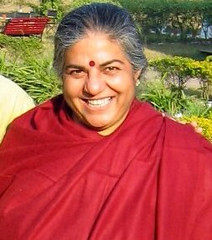The theme of this year’s event, put on by the International Living Future Institute, is Women Reshaping the World, and Shiva opened her remarks with a reference to the “feminine principle” of Shakti, the concept of feminine creative power in Hinduism, which can also be present in males, and which means “to be able” and refers to empowerment.
“The vocabulary is shifting,” she said. “And it should. Words signify imagination and we need a shift from dominance because it is failing us and the planet.” The mistake she sees is a system of artificial boundaries. These, she notes, are part of the unfortunate, destructive, and hubristic elevation of man over nature. “We need to give up the hubris of that notion and embrace interdependence. We may be in the anthropocene, but we can make this cooperative, creative anthropocene, rather than an age of dominance.”She referenced her attempts to talk to naysayers at the highest level, scientists and thinkers who claim that traditional agricultural methods and economic systems will never be sufficient to feed the world’s population. When she queries them about the “externalities” and unintended consequences of their monoculture solutions, they say, about water or soil health or other matters: “that’s not my department,” or “that wasn’t part of my study.” But as Shiva points out, “If you want to build a living future, everything is your department.”
Her biggest complaint about the current approach, and the artificial boundaries that she sees as part of capitalism, is the persistent devaluation of the work of the planet and of women. In particular, she pointed to the economic valuation system that had created a false production boundary: “If producers consume what they produce—such as food in a family or community garden—they are, somehow, not producing anything. In other words, production takes place only when commodification begins, but not before. This results, perversely, in a system that produces less and less while pretending to produce more and more. We are in a situation where we are using increasingly more units of energy to produce fewer and fewer units of food.” More
